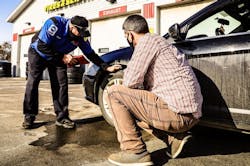Tire Dealer Survival Guide: How to Create a Repeatable, Superior Customer Experience
This Tire Dealer Survival Guide exclusive can also be found inside the May edition of MTD.
Some tire dealerships provide “customer service.” Other tire dealerships provide what I call a “customer experience.” What does your dealership offer? Before we dive in, let’s first determine the difference between a customer experience and good, old-fashioned customer service.
The short definition of customer service is “making sure your customer is happy.” For example, the customer comes in for an oil change and a tire rotation and you perform the services requested. The customer pays and you hand over the keys.
Most tire dealerships in North America can do this in their sleep, but here’s the problem.
In a traditional “customer service” transaction, the customer will not tell anyone about you unless someone proactively asks them to recommend a good place to buy new tires or get their oil changed.
In other words, the customer will not “sell” other people on your dealership and the customer service you provide. Furthermore, if someone else delivers a pitch praising one of your competitors and that competitor happens to provide a consistently superior customer experience, that potential new client will most likely be convinced to try your competitor.
Why? Because of the passion of the original customer, who has engaged with your competitor in a memorable, meaningful and measurable way. (More about that at the end of this article).
I have a good friend and former client who owns seven tire stores. He told his managers one day, “We are not competing against other tire dealerships as much as we are competing against the experience that our customers get at every Starbucks and Chik-fil-A. The old-fashioned ‘Can I help you?’ doesn’t work anymore.”
I must agree with my friend. You need to understand the difference between delivering customer service and delivering a customer experience.
How is “customer experience” defined? Simply put, it’s how customers perceive their interactions with your company. It’s not what you think. It’s not what the manager of your store thinks. It’s what the customer thinks.
I have spoken with countless tire dealers who have scratched their heads, wondering why their stores do not grow at the rate they thought they could - or should.
These dealers were not delivering a consistent, superior customer experience. How about your dealership? Ask yourself the following two questions:
1. First, do I have it? As you analyze your own business, it’s important to know if you have a customer experience process that can be delivered every day. If a customer is not asking members of your counter sales team the following question - “Are you the owner or one of the owners of this business?” - at least 30% of the time, you most likely do not have a defined and/or implemented customer experience process that is repeatable.
If customers are not asking the above question regularly, you most likely have some work to do in order to develop a repeatable customer experience process that can be executed with every customer, every time.
Also, ask yourself, “Are my people creating such a memorable experience that my customers will immediately go out and tell three to ve other people about it?” Again, if the answer is “no,” you have some work to do.
2. What should I do if I realize that I don’t have a consistent customer experience process? Hire an expert to assess the experience your dealership is currently delivering via phone, as well as in person. is usually is not expensive and has a very strong return on investment. Why? Your people will always engage with a customer the right way when you are around. You have to measure and evaluate through a third party if you want the real story.
As mentioned before, a superior customer experience should be memorable, meaningful and measurable. And it should be repeatable.
That experience is always based upon the customer’s perception of your business, as well as how those customers interact with your business and employees.
Your employees have the power to create an experience that is so memorable that the customer will not allow a competitor into their brain — no matter what sale or discount they see.
But you have to be intentional about how you engage with every customer. You must engage in those ways that matter most to them. And I assure you, engagement is not driven by price.
Putting this into practice takes a lot of time and effort.
Chik-fil-A gives its employees detailed instructions and training on how to speak, smile and ask questions in every single customer engagement, as if they are performers on a stage. Ritz-Carlton teaches its people to make an impact on guests with meaningful interactions like name recognition and engaging with customers as a “servant.”
When your employees do the same, your advertising costs should go down and your sales should go up.
Four good reasons
You might be thinking, “What’s the big deal? Why is it so important that I implement a customer experience process at my dealership?” I’ll give you four compelling reasons:
1.Your margins will increase. Publix Super Markets, one of the most successful supermarket chains in the country, has a de ned, repeatable customer experience process and its pro t margin is almost double that of its competitor, Kroger.
Your margins will be higher if you implement a defined, repeatable customer experience process, as well.
One reason is that you will have less customer turnover and less employee turnover. And you will keep your employees longer because they will be happier now that they have been equipped to create the best buying experience for your customers.
Most businesses fail to deliver a superior customer experience because their employees are unhappy or are unwilling to adopt the processes that are needed to create an amazing experience, based on each customer’s needs.
2.You will create brand ambassadors. This is different than traditional word of mouth marketing. Brand ambassadors are what have helped brands like Chik-fil-A, Apple and Disney achieve their market dominance. And yes - each company listed above has a repeatable customer experience process.
3.Your business will be worth more with a customer experience process in place. If in doubt, check out the stock performance of those companies that provide a superior customer experience process. A customer experience process also will help ensure the sustainability of your business long a er you have retired or moved to another project.
4. Trust from all of your customers will increase. When customers perceive that you are serving them through a robust customer experience process, endorphins release that cause them to feel how much you really care about them and how you keep them safe on the road. This has been proven numerous times. We all know that when we trust the people we buy from, everybody wins.
Implementation of a customer experience process can be difficult because it requires a willingness to change. Change is difficult for some people because the other side of that coin is tension.
Most of my clients are glad they endured the tension of change in order to implement a superior customer experience process.
Also, implementation of a customer experience process can be fun and should be fun. When your people see the reaction of customers and how much easier those customers are to deal with, they will be all-in. And finally, why should you invest in developing a customer experience process now? You might be thinking, “I am already busy enough.”
The truth of the matter is that you are never too busy to develop - and deploy - a robust customer experience process. And the sooner you start, the better.
Mike Townsend is the owner of Townsend Strategies, a sales coaching and leadership coaching business. He has 30 years of sales experience - half of them in the tire industry. As a Six Sigma black belt and professional trainer, Townsend says he “has witnessed every scenario and heard every objection in the retail tire environment.” He also recommends using a voice-of-the-customer survey to find out what people really think of your business. “There are two questions you need to ask,” he says. For more information, email Townsend at [email protected].
Recently published Tire Dealer Survival Guide articles can be accessed below:
Tire Dealer Survival Guide: How to Use Digital Tools, Data to Target New Customers
Tire Dealer Survival Guide: How to Manage COVID-19 Vaccinations, Employee Privacy and More
About the Author

Mike Townsend
Mike Townsend is the owner of Townsend Strategies, a sales and leadership training and marketing company that advises independent tire dealerships. To contact Townsend, email him at [email protected].
